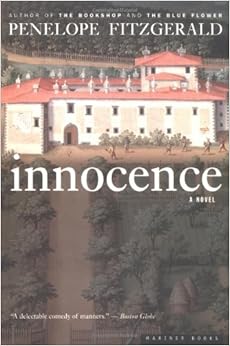Salvatore and Chiara never quarrelled twice on the same subject. Each battle, as it closed, was recorded in their memories, as in an elementary history book. In these books you usually get three or four causes of hostilities given, and afterwards three or four results, which have to be learned by heart. It must have been eight weeks or more before there was any kid of dispute between them in public.
Chiara Ridolfi is the daughter of a Tuscan Count, whose noble family is not quite as wealthy as it once was. Salvatore Rossi is a no-nonsense doctor, brought up in poverty in the south of Italy. These two meet, only briefly, at a piano concert, but afterwards neither can stop thinking of the other. After a strange and abortive courtship, which consists mostly of creepy stalking, they get married, only half understanding each other. In another novel, this might be a recipe for disaster, or tragedy, but Fitzgerald is optimistic about human beings' abilities to reach out from the social bubbles in which they are born in live.
The novel opens with an account of the Ridolfi family, whose estate Ricordanza ("remembrance," appopriately) is still flanked by a pair of stone midgets that represent Chiara's little-person ancestors:
With great difficulty and many enquiries the Ridolfi followed up reported instances of midget families, so that by the time she was six their only child had a retinue suitable to her position, a tiny governess, a tiny doctor, a tiny notary, and so forth, all to size. The child never went out, and was confident that the world consisted of people less than 1.3 metres high. To amuse her, a dwarf (not a midget) was sent for from Valmarana, but without success. She pitied him, because she thought that he must suffer knowing that, as a dwarf, he was different from anyone else at Ricordanza. Then, in trying harder and harder to make her laugh, he fell and cracked his head, which made the little girl cry so bitterly that he had to be sent away.
Like the midget Contessa, both Chiara and Salvatore have difficulty engaging with those beyond their own small universes, but their infatuation for each other compels them to new worlds. Chiara is young, unsure, and somewhat insulated by her class. Salvatore is formed by the indignity of his childhood poverty, and the memory of his father's ardent Communism. There is a great scene in which the young Salvatore visits the Italian Communist leader Gramsci, whom his father idolizes, during the last days of the dehabilitating illness that eventually killed Gramsci:
Salvatore knew by now the question he ought to put... He was quite well used to being told to put questions, as well as answering them, in the presence of a school inspector. That was simply a matter of knowing what was wanted. The more important these men were, the easier it was to reply. ne of them had told the whole class to remains tanding and to answer the question in the first liens of the Fascist Chorus of Youth: "Duce, Duce, when the time comes, who will not know how to die for you?" Impossible to go wrong there. But Salvatore had also half-absorbed from the long droning evenings in the passage room, and form what they had earnestly tried to explain to him, the concerns of his father and Sannazzaro. Suppose he tried: "Comrade Gramsci, sir, when the time comes, who will not want liberty?"
Courage. But the words he had formed in his mind suddenly made themselves scarce, and still wanting and intending to say something quite different he asked loudly: "Why are you bleeding?"
Salvatore's experience seeing his father's idol disintegrate taught him to be beyond both sentiment and politics, and to cling to what is rational. This is what makes him a great doctor, but also an irascible person, and unable to relate easily to other people:
"I've been told she has an aunt, an eccentric, possibly of unsound mind. Don't you think that Chiara should be forcibly separated from her?"
"You can't expect me to have an opinion. But if she has an aunt, I suppose it's natural that this young woman should be fond of her."
"Natural! It's not natural, Nature is something quite else. Do you think that a horse, or a pigeon, is fond of its aunt? Could it recognise its aunt as such?"
"Perhaps not, but in ordinary human society..."
"So you're trying once again to distinguish us from the rest of animal creation," cried Salvatore in tones of angry satisfaction. "You renounce behaviorism. Is that what I'm to understand?"
Salvatore's a terrific, completely realized character, in a book full of them. I'm consistently impressed by Fitzgerald's ability to draw vivid, human characters, even at the edges of the novel: Chiara's brash English friend Barney, her taciturn cousin Chiara, the servant, Bernardino, who is under the impression that he is the actual owner of the Ridolfi estate. Fitzgerald is good at creating the impression that, rather than dictating the actions of her characters, she simply makes them and then lets them loose, and the plot results organically from their human interactions.
I realized after finishing this novel that there are only two novels by Fitzgerald, who didn't start writing fiction until she was in her sixties, that I haven't read. That makes me deeply sad. Every time I finish one of her books I want to find another, and read it immediately, but I think in this case I need to practice the virtue of delayed gratification.


1 comment:
The Blue Flower >
At Freddie's >
Innocence >
The Bookshop >
Offshore >
Human Voices >
The Gate of Angels
Post a Comment